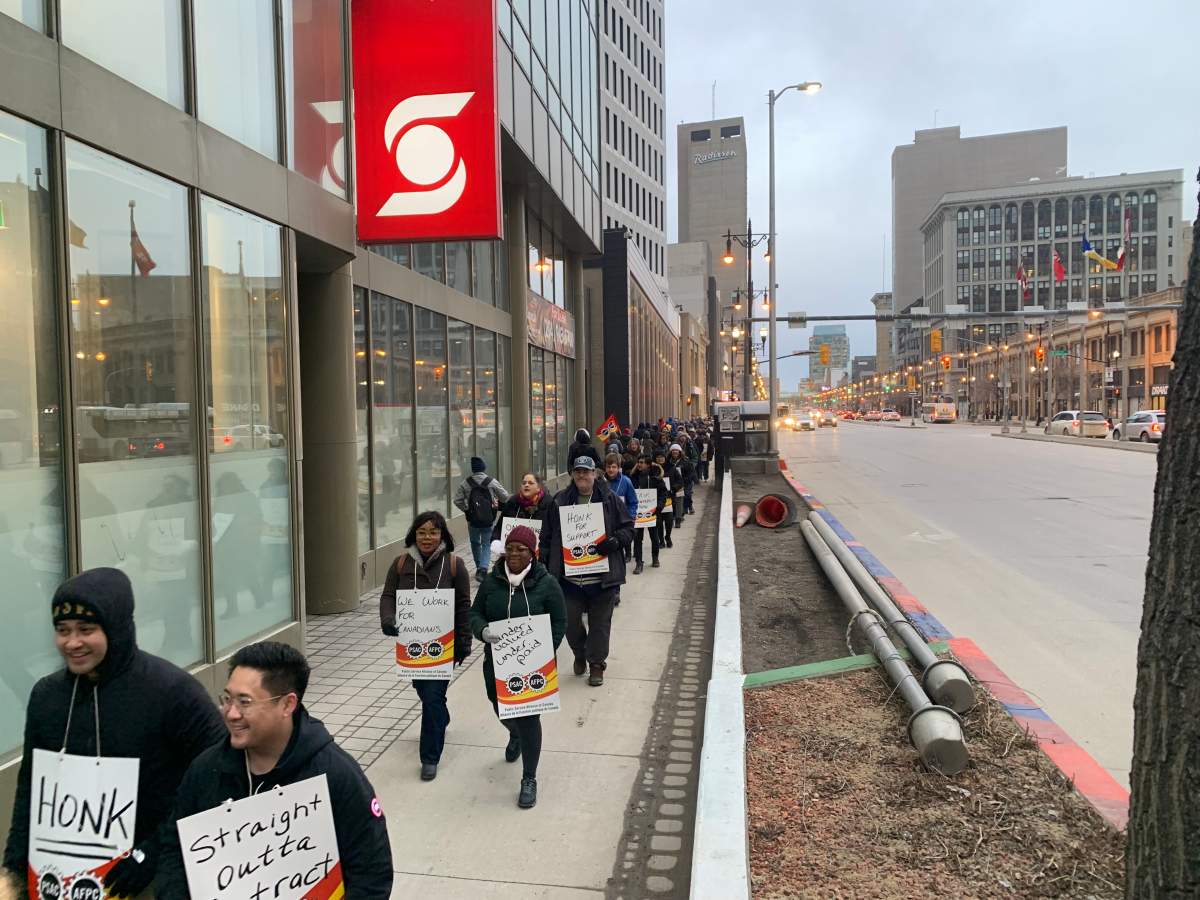Nine-thousand federal government employees in Manitoba joined the picket line on Wednesday when 155 thousand federal workers with the Public Service Alliance of Canada (PSAC) went on strike after failing to reach a deal with the government by Tuesday night’s deadline.

There are groups along Main Street in Winnipeg outside the passport office, the Grain Commission building near the train station, and off Regent at the main office for the Canada Revenue Agency.
Members have several striking points including wage increases to meet the cost of living and an option to work remotely if their job allows for it, Regional Executive Vice President for the Prairies, Marianne Hladun said.
Negotiations have been going on for about two years and some services will be impacted as a result of the strike.

Get breaking National news
“Correctional services, passports, heritage, all of the service Canada, the pension centres, all of the agriculture units, department of defense, we are the cleaners, we are the clerks, we’re the mailroom people. You know, we are the ones you really need to be able to deliver these services.” said Hladun.
- Bombardier warns of ‘significant impact’ to travellers from Trump’s threat
- Stepfather of two missing N.S. kids charged with sexual assault of adult, forcible confinement
- Trump threatens Canada with 50% tariff on aircraft sold to U.S.
- Canadians have billions in uncashed cheques, rebates. Are you one of them?
“Some members are designated as essential, they are doing the duties that are deemed to be essential for the health and safety of Canadians and the rest of the people are out so there could be delays and we apologize but had the government come with a fair offer two and half weeks ago, two years ago, we would not be in this situation.”
The Keystone Agricultural Producer (KAP) has expressed concerns regarding the potential impact of the strike action on Manitoba farmers and the agricultural sector.
“PSAC represents thousands of public service employees who play a key role in the delivery and administration of agricultural programs and services, including the suite of business risk management programs and programming in the new Sustainable CAP that producers rely so heavily on to help run their operations” said KAP president, Jill Verwey in a press release.
Verway said KAP respects the rights of Canadian workers to strike but it could negatively impact grain shipments which in turn would result in restricted cash flow for farmers, as well as increased demurrage costs for grain companies.
“Restrictions in cash flow could hamper a farmer’s ability to market their remaining 2022 crop as well as their ability to purchase inputs for the 2023 crop year.”
“KAP calls on both PSAC and the Government of Canada to continue an open dialogue through negotiations, with adequate contingencies in place to minimize negative impacts on the grain handling system and ensure that all agricultural programs continue to be delivered uninterrupted,”
However, union members have said they are prepared to stay out as long as it takes to reach a fair agreement. “I’m happy to be supporting our union and our cause,” said Tracy Finsten, a union member.
Meanwhile, the federal director of the Canadian Taxpayer’s Federation, Franco Terrazano, thinks the union’s demands are ridiculous.

“They wanna make more money if they stay in the office past 4 p.m. They want taxpayer-funded contribution into a union-controlled social justice fund so they can advocate on certain policy. They want an education fund of up to $17,000 for a laid-off employee.”
Terrazano said more than 312,000 federal employees have received at least one pay raise in the past four years.
“The feds have handed out five-hundred and fifty-nine million dollars in bonuses, over the last couple of years.”
He said if the union gets its demands, taxpayers will again be on the hook for the increased costs.
“Taxpayers paid for hundreds of thousands of pay raises, hundreds of millions in bonuses, and for tens of thousands of new government employees. Now you have union negotiators in Ottawa who are demanding $9.3 billion more from struggling taxpayers.”














Comments